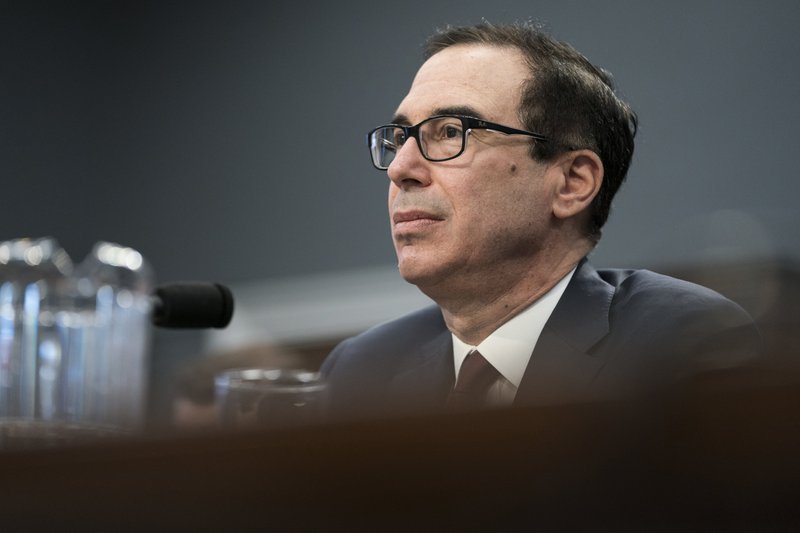WASHINGTON -- The House sued the Treasury Department and the Internal Revenue Service on Tuesday, demanding access to President Donald Trump's tax returns and escalating a fight with an administration that has repeatedly dismissed as illegitimate its attempt to obtain the financial records.
The lawsuit moves the dispute into the federal courts after months of sniping between the Democratic-led House Ways and Means Committee, which requested and then subpoenaed the returns, and Treasury Secretary Steven Mnuchin. The case may ultimately go to the Supreme Court, and its outcome is likely to determine whether financial information that Trump has kept closely guarded despite long-standing presidential tradition will be viewed by Congress and, ultimately, the public.
"In refusing to comply with the statute, defendants have mounted an extraordinary attack on the authority of Congress to obtain information needed to conduct oversight of Treasury, the IRS, and the tax laws on behalf of the American people who participate in the nation's voluntary tax system," the complaint said. It asked a judge to order the defendants to comply.
House Democrats are facing similar resistance on a broad range of investigations that include inquiries into Robert Mueller's investigation into Russian election interference and the profits gleaned from Trump's continuing business ventures.
In almost every instance, the Trump administration has argued that Congress' power to gain access to those materials is inherently limited to information that would serve "legitimate" legislative purposes -- defined by the executive branch to be limited to materials needed to help draft new laws and to exclude uncovering potential wrongdoing.
Congress retorts that its powers to compel information are far more sweeping than that and encompass oversight of important matters in general -- and that its decisions about what information it wants to subpoena are not to be second-guessed by the White House.
The same dispute is at the center of a pair of lawsuits over subpoenas to accounting and banking firms for other financial records involving the Trump Organization. Trump's lawyers have twice tried and failed to win court orders blocking subpoenas seeking records from Trump's bankers and accountants. His attorneys are appealing those rulings. A federal judge in May said U.S. lawmakers have the power to demand Trump's financial records from his accounting firm, Mazars USA LLP.
Trump was the first major presidential candidate in decades not to voluntarily release his tax returns. He has said the returns were under audit by the IRS, but that does not actually preclude him from releasing them to the public.
The chairman of the Ways and Means Committee, Rep. Richard Neal, D-Mass., initially requested six years of Trump's personal and business returns in early April using a provision of the federal tax code that grants the chairmen of Congress' tax-writing committees the power to request tax information on any filer. The provision in question -- Section 6103 -- dates to the Teapot Dome scandal of the 1920s and says merely that the Treasury secretary "shall" furnish the requested material.
Neal said he needed the returns, as well as audit information from the IRS, for a study of the efficacy of the agency's mandatory presidential audit program that could potentially result in legislative changes.
Mnuchin rejected the request anyway, prompting Neal to shift tactics and counter in May by issuing subpoenas for the same material. That led to another rejection by Mnuchin. Both times, he said the requests lacked any "legitimate legislative purpose."
The House suit asks a federal judge to enforce both approaches, validating the committee's use of Section 6103 and Neal's subpoenas. It says that "numerous investigative reports have revealed that President Trump, through the complex arrangements of his personal and business finances, has engaged in multiple aggressive tax strategies and decades-long tax avoidance schemes."
The Justice Department's Office of Legal Counsel last month endorsed Mnuchin's rationale with a 33-page memo. The department pointed to it again Tuesday, while otherwise declining to comment on the case. The Treasury Department did not respond to a request for comment.
In the memo, Steven Engel, the head of the office, cited comments by Neal and other Democrats that suggested, among other things, that they wanted to obtain and disclose Trump's tax returns to "'honor tradition,' show 'what the Russians have on Donald Trump,' reveal a potential 'Chinese connection,' inform tax reform legislation, provide the 'clearest picture of his financial health,'" and expose any hidden business dealings that may run afoul of the Constitution's ban on receiving "emoluments" from foreign governments.
Against that backdrop, Engel dismissed Neal's stated official rationale for seeking the returns -- that Congress needs them for an investigation into how the IRS audits and enforces federal tax laws against presidents -- as "pretextual," saying lawmakers instead wanted them for the political purpose of disclosing them. That purpose, he said, was not within Congress' legitimate constitutional authority.
The Trump administration and the president's personal lawyers have raised the "legitimate purpose" argument repeatedly as they have sought to parry Democratic demands for information related to not just Trump's finances but also issues ranging from the special counsel's Trump-Russia investigation to the granting of security clearances to close Trump associates.
Last month, the House passed a resolution that cleared the way for committees to file lawsuits asking a court to order the executive branch to comply with their subpoenas without further action on the full House floor. The Ways and Means Committee lawsuit for Trump's tax returns is the first exercise of that authority.
Some legal experts believe the battle could last well past the 2020 presidential election.
The case is Committee on Ways and Means v. U.S. Department of the Treasury, 19-cv-1974, U.S. District Court, District of Columbia (Washington).
Information for this article was contributed by Nicholas Fandos and Charlie Savage of The New York Times; and by Joe Light, Andrew Harris and Laura Davison of Bloomberg News.
A Section on 07/03/2019
